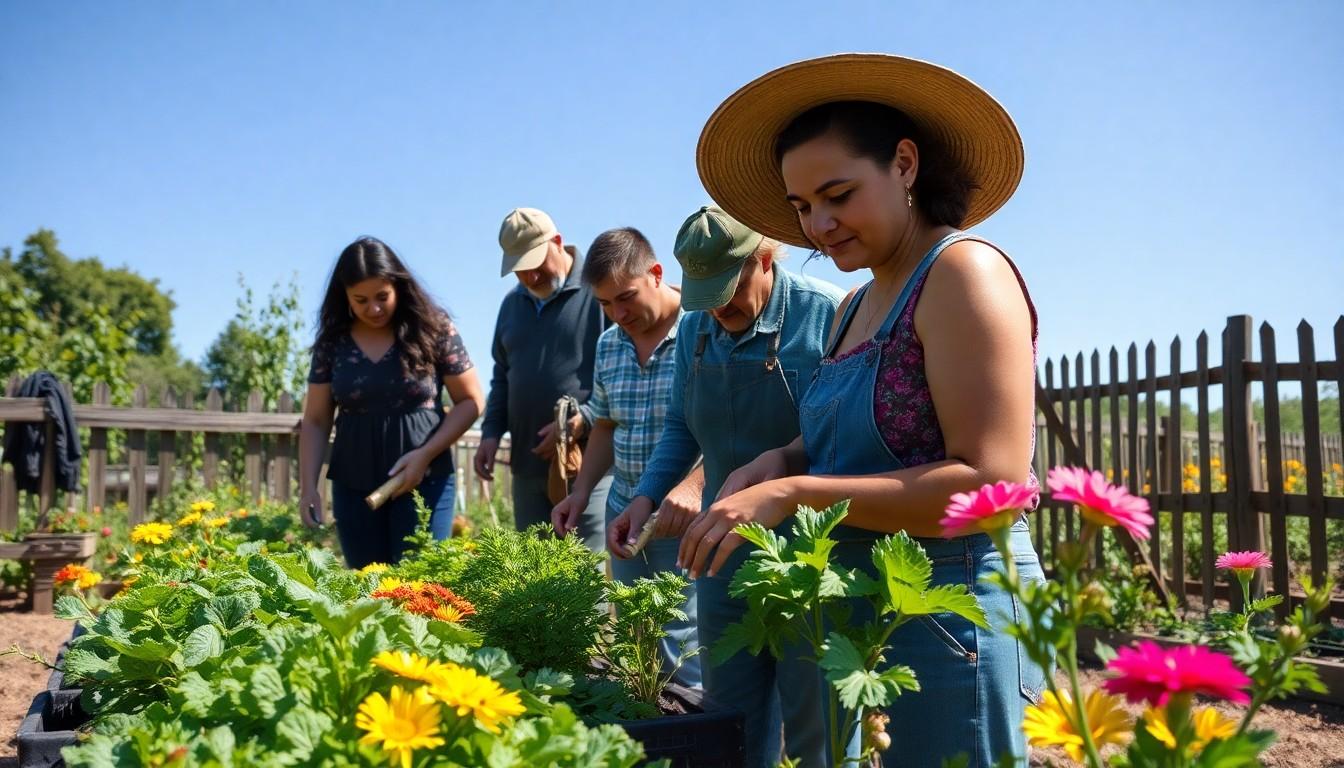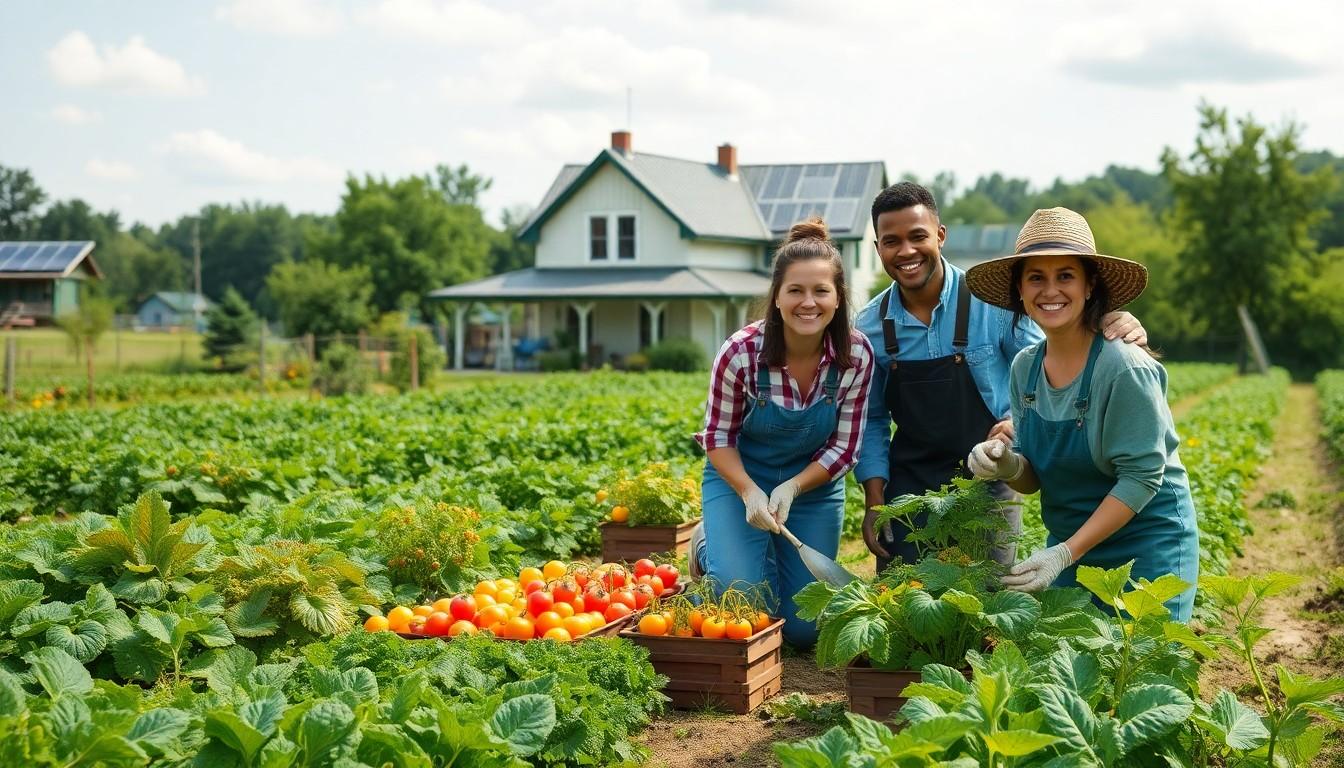In the heart of the Bluegrass State, where the horses run wild and the bourbon flows like a river, a quiet revolution is brewing. Kentucky sustainable living isn’t just a trend; it’s a lifestyle that’s as rich as its history. Imagine sipping sweet tea on a porch made from reclaimed wood while your garden flourishes with organic veggies. It’s a blend of tradition and innovation that’s got everyone talking, and for good reason.
Kentucky’s unique charm isn’t just in its rolling hills and vibrant culture; it’s also in its commitment to a greener future. From eco-friendly farms to energy-efficient homes, the state is proving that sustainability can be both practical and delightful. So, whether you’re a local or just passing through, get ready to embrace a way of life that’s not only good for the planet but also downright enjoyable. After all, who wouldn’t want to save the Earth while enjoying a slice of pie?
Kentucky Sustainable Living
Kentucky’s sustainable living movement reflects a strong commitment to environmental stewardship. Residents engage in organic gardening, ensuring fresh produce while promoting biodiversity. Many families adopt eco-friendly practices, such as composting and recycling, to reduce waste and conserve resources.
Thriving eco-friendly farms populate the landscape, showcasing a diverse range of sustainable agriculture practices. These farms prioritize local produce, strengthening community ties and reducing carbon footprints. Energy-efficient homes emerge as a staple, encouraging homeowners to utilize renewable energy sources and advanced insulation techniques.
Innovative businesses contribute significantly by offering sustainable products and services. Local markets promote these goods, benefiting both the economy and the environment. Workshops on sustainable living educate citizens about practices that foster a greener lifestyle.
Collaborative efforts among communities emphasize the importance of conserving natural resources. Local organizations spearhead initiatives aimed at raising awareness and encouraging participation in sustainable programs. Residents often participate in community gardens, which not only provide fresh food but also serve as social hubs for education and interaction.
Government entities support resilient living through policies that promote sustainability. Recent legislation encourages responsible land use and protects natural habitats. These initiatives create opportunities for residents to be actively involved in preserving Kentucky’s rich natural resources.
Overall, Kentucky’s blend of tradition and sustainability showcases a lifestyle that can inspire others. This commitment to green living highlights the state’s determination to build a healthier and more sustainable future.
Key Principles of Sustainable Living

Sustainable living in Kentucky centers around key principles that promote a healthier environment and community. Residents embrace practices that enhance their connection to nature and one another.
Environmental Stewardship
Environmental stewardship encourages proactive care for natural resources in Kentucky. By adopting organic gardening, individuals reduce chemical usage and support biodiversity. Composting and recycling initiatives help divert waste from landfills, benefiting ecosystems. Utilizing renewable energy sources, such as solar and wind, conserves energy and decreases greenhouse gas emissions. Many local farmers prioritize sustainable agriculture, ensuring fresh produce is available while maintaining soil health. Such efforts illustrate Kentucky’s commitment to preserving its natural landscapes.
Community Engagement
Community engagement plays a vital role in Kentucky’s sustainable living movement. Collaborative efforts, like community gardens, bring individuals together to share resources and knowledge. Local markets foster connections between consumers and producers, promoting the purchase of locally sourced products. Educational workshops equip citizens with skills for sustainable practices, like DIY composting and energy efficiency. Neighborhood groups often cooperate to advocate for responsible land use policies, amplifying voices that prioritize green initiatives. Through these communal actions, Kentuckians strengthen their ties, creating a more sustainable future.
Sustainable Agriculture in Kentucky
Sustainable agriculture plays a crucial role in Kentucky’s commitment to environmental stewardship. This approach emphasizes health and well-being while enhancing local ecosystems.
Organic Farming Practices
Farmers in Kentucky increasingly adopt organic farming practices. Techniques such as crop rotation and natural pest management promote biodiversity and preserve soil health. Many local farms avoid harmful chemicals, opting instead for organic fertilizers and compost. Additionally, this farming method enhances food safety by minimizing synthetic pesticide use and improving produce quality. Through education and resources, agricultural organizations support farmers transitioning to organic methods. These practices not only yield nutritious crops but also contribute to a more sustainable agricultural landscape.
Local Food Systems
Local food systems thrive in Kentucky, creating strong connections between farmers and communities. These networks enhance food security by providing fresh produce to consumers. Farmers’ markets flourish, offering a variety of locally grown fruits and vegetables. Community-supported agriculture allows consumers to purchase shares directly from growers, ensuring a steady supply of seasonal goods. This direct relationship reduces transportation emissions and encourages stronger local economies. Educational initiatives raise awareness about the benefits of eating local, further strengthening these systems.
Renewable Energy Initiatives
Kentucky embraces renewable energy initiatives to advance sustainable living. Residents increasingly rely on solar and wind energy, aligning with environmental goals.
Solar Energy Adoption
Solar energy adoption has gained traction across the state. More homeowners install solar panels, reducing utility bills and carbon footprints. According to the Solar Energy Industries Association, Kentucky experienced a 60% increase in solar capacity in 2022. This growth resulted in over 200 local solar companies offering affordable installation options. Community solar projects also expand, enabling those unable to install panels on their properties to access renewable energy credits. Engagement from local governments further supports this movement, providing incentives and rebates to encourage solar investment.
Wind Energy Potential
Wind energy potential in Kentucky shows promising results. The National Renewable Energy Laboratory estimates the state can generate 300,000 megawatts of power through wind resources. Areas such as the eastern foothills and western plains demonstrate significant capacity for wind farms. Several projects aim to harness this potential, contributing to the state’s energy mix. Kentucky’s wind initiatives create jobs and stimulate local economies while diversifying energy sources. Organizations collaborate to promote awareness and development, emphasizing the importance of wind energy in achieving long-term sustainability.
Eco-Friendly Transportation Options
Kentucky offers various eco-friendly transportation options that align with its sustainable living initiatives. These alternatives reduce carbon footprints while promoting healthier lifestyles.
Public Transit Systems
Public transit systems in Kentucky play a crucial role in sustainable transportation. Several cities operate bus services that encourage residents to utilize mass transit instead of personal vehicles. For instance, Louisville’s Transit Authority provides a comprehensive network serving diverse neighborhoods, reducing overall traffic congestion and emissions. Participation in public transit not only benefits the environment but also enhances accessibility for all residents. Efforts continue to improve these systems, ensuring they remain efficient and user-friendly.
Biking and Walking Paths
Biking and walking paths contribute significantly to eco-friendly transportation options throughout Kentucky. Communities prioritize creating safe and well-maintained routes to encourage cyclists and pedestrians. Cities like Lexington have expanded their trail networks, with over 100 miles of dedicated paths to promote active transportation. Engaging in these activities fosters healthier lifestyles while minimizing the need for vehicles. Additionally, local organizations often host events that raise awareness about the benefits of biking and walking, reinforcing their importance in sustainable living.
Embrace a More Sustainable Lifestyle
Kentucky’s commitment to sustainable living showcases a vibrant community dedicated to preserving its natural resources while fostering innovation. By blending traditional practices with modern solutions, residents are creating a sustainable future that benefits both the environment and local economies.
The emphasis on local food systems renewable energy and eco-friendly transportation reflects a growing awareness of the importance of sustainable choices. Through education and community engagement Kentuckians are not just advocating for change but actively participating in it.
As this movement continues to gain momentum it serves as an inspiring example for others seeking to embrace a more sustainable lifestyle.

